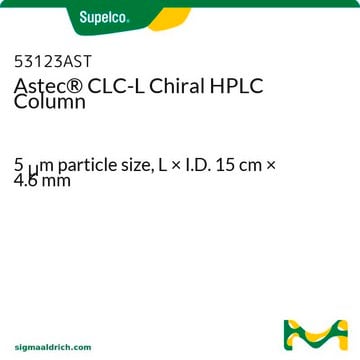13022AST
Astec® CHIROBIOTIC® R Chiral (5 μm) HPLC Columns
L × I.D. 10 cm × 4.6 mm, HPLC Column
Sign Into View Organizational & Contract Pricing
All Photos(1)
About This Item
UNSPSC Code:
41115700
eCl@ss:
32110501
NACRES:
SB.52
Recommended Products
product name
Astec® CHIROBIOTIC® R Chiral HPLC Column, 5 μm particle size, L × I.D. 10 cm × 4.6 mm
material
stainless steel column
description
HPLC column
product line
Astec®
packaging
pkg of 1 ea
manufacturer/tradename
Astec®
parameter
0-45 °C temperature
241 bar pressure (3500 psi)
technique(s)
HPLC: suitable
LC/MS: suitable
L × I.D.
10 cm × 4.6 mm
matrix
high-purity silica gel particle platform
fully porous particle
matrix active group
ristocetin A glycopeptide phase
particle size
5 μm
pore size
100 Å
operating pH range
3.5-6.8
separation technique
chiral
Looking for similar products? Visit Product Comparison Guide
Related Categories
General description
CHIROBIOTIC® R, based on the ristocetin A glycopeptide covalently bonded to high purity silica particles, has shown particular applicability to enantiomers of anionic compounds. Selectivity on CHIROBIOTIC® R strongly correlates to the organic modifier, favoring the alcohol-type mobile phases by a large margin.
CHIROBIOTIC FAQs
CHIROBIOTIC Reference Bibliography
Chiral Product Literature
- Bonded phase: Ristocetin A
- Operating pH range: 3.5 - 6.8
- Particle diameter: 5, 10 or 16 μm
- Pore size: 100 Å
CHIROBIOTIC FAQs
CHIROBIOTIC Reference Bibliography
Chiral Product Literature
Legal Information
Astec is a registered trademark of Merck KGaA, Darmstadt, Germany
CHIROBIOTIC is a registered trademark of Sigma-Aldrich Co. LLC
Choose from one of the most recent versions:
Already Own This Product?
Find documentation for the products that you have recently purchased in the Document Library.
Enzyme-catalyzed synthesis of (R)- and (S)-3-hydroxy-3-(10-alkyl-10H-phenothiazin-3-yl)propanoic acids
Brem, Jurgen, et al.
Tetrahedron Asymmetry, 21 (3), 365-373 (2010)
H Henry et al.
Biomedical chromatography : BMC, 26(4), 425-428 (2011-08-16)
D-lactic acid in urine originates mainly from bacterial production in the intestinal tract. Increased D-lactate excretion as observed in patients affected by short bowel syndrome or necrotizing enterocolitis reflects D-lactic overproduction. Therefore, there is a need for a reliable and
B DeCruze et al.
Clinical oncology (Royal College of Radiologists (Great Britain)), 11(4), 252-254 (1999-09-04)
Poor prognosis (poorly differentiated and/or deep myometrial invasion) Stage I endometrial cancer can have a relapse rate as high as 50%. Traditionally, most clinical oncologists treat these patients with external beam radiotherapy after surgery but there is no evidence to
Sébastien Canneaux et al.
The journal of physical chemistry. A, 114(34), 9270-9288 (2010-08-03)
The rate constants of the reactions of iodine atoms with H(2), H(2)O, HI, and OH have been estimated using 39, 21, 13, and 39 different levels of theory, respectively, and have been compared to the available literature values over the
Diane E Halliwell et al.
Scientific data, 4, 170084-170084 (2017-07-12)
Using a scanning near-field optical microscope coupled to an infrared free electron laser (SNOM-IR-FEL) in low-resolution transmission mode, we collected chemical data from whole cervical cells obtained from 5 pre-menopausal, non-pregnant women of reproductive age, and cytologically classified as normal
Chromatograms
application for HPLCOur team of scientists has experience in all areas of research including Life Science, Material Science, Chemical Synthesis, Chromatography, Analytical and many others.
Contact Technical Service





